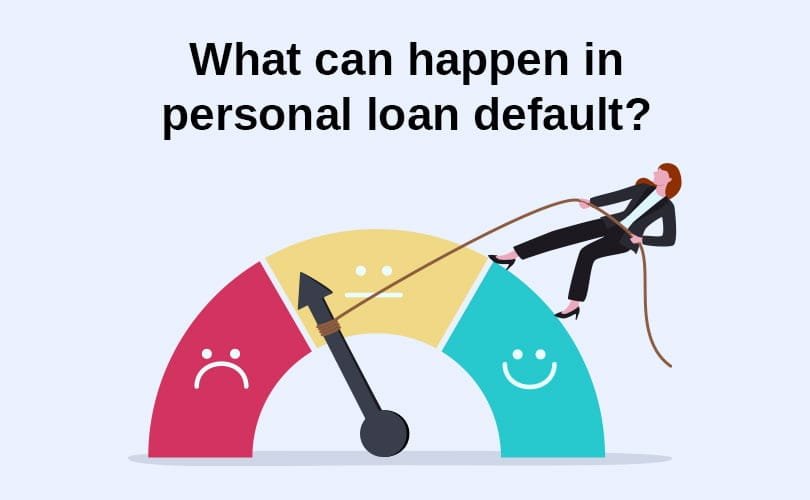We are an independent, advertising-supported comparison service. Our objective is to empower you to make confident financial decisions by giving you access to interactive tools and financial calculators, publishing original and unbiased content, and allowing you to conduct free research and information comparisons.
Issuers that Bankrate has partnerships with include American Express, Bank of America, Capital One, Chase, Citi, and Discover, among others.

When is a personal loan in default?
A personal loan that is in default usually indicates that a payment is 90 days overdue. The terms of your loan agreement, the lender, and the type of loan will determine the precise timing.
If a personal loan payment is just a few days overdue, it is considered delinquent but not in default. After the ten to fifteen-day grace period, you might be assessed a late fee. The amount that can be charged for the fee is either a dollar amount ($15 to $40) or a percentage of the amount that must be paid (about 205%).
For the lender to report a late payment to the credit bureaus, the payment must be past due by a minimum of thirty days. If you have good to excellent credit (690 to 850), missing payments can lower your FICO score by as much as 100 points.
In addition to negatively impacting your credit score, late payments can make it more difficult for you to get new credit because they can remain on your record for up to seven years.
Personal loan default consequences
When a loan defaults, the lender will either sell the outstanding debt to a third-party debt collector or transfer it to an internal collections department. The collection company may contact you by phone, letter, email, or text message in an effort to collect the debt.
In the event that your loan is unsecured, the lender or debt collector may file a lawsuit against you in order to garnish your wages or put a lien on any property you own, like your home.
As specified in the loan agreement, the lender has the right to seize the asset to recoup its losses if the loan is secured by it, such as your vehicle, savings account, or investment accounts.
For instance, the lender might send a letter requesting payment if the loan was backed by the title to a car. If the loan is not repaid within the allotted time, it may take possession of the car.
Lastly, if you have a co-applicant on your loan—either a co-signer or a co-borrower—that person will be responsible for payment in the event that you fail.
What to do if you face loan default
Get in touch with the lender: Take the initiative and give them a call before your next payment is due. If you explain your circumstances to the lender, they might be able to offer some relief, like a temporary suspension or deferment of loan payments.
Know your rights: If your debt has already entered collections or you are in default, be aware of your rights under the Fair Debt Collection Practices Act (FDCPA).
It’s illegal for debt collectors to use abusive, unfair or deceptive practices when attempting to collect on debts. If a debt collector is harassing you or breaking the law, you can file a complaint with the Consumer Financial Protection Bureau and contact your state’s attorney general.
Speak with a lawyer: Getting legal counsel is probably the best thing to do if you’ve already received a lawsuit.
In order to prevent a default judgment—a ruling in which the judge automatically decides in favor of the debt collector or lender—you will need to appear in court.
Consult a credit counseling agency: They can assist you in improving your budget or coming up with a new one, which will free up funds to help you pay off your debts and remain current on all of them.

FAQ
How bad is it to default on a personal loan?
Loan default can have a devastating effect on your credit and result in permanent financial repercussions, such as asset loss, wage garnishment, and more. Debt consolidation could help you prevent loan default if your debt is out of control.
What happens if I don’t pay back a personal loan?
Your creditor will be aware that you are unable to repay the loan once you default. After that, they might go into collections mode and either assign you to a team of internal collectors or sell your debt to a third-party debt collector.
Is it a crime to default on a loan?
Furthermore, missing payments on a loan can harm your credit score, which is exceedingly difficult to reverse. Payment history accounts for 35% of your FICO score. Most importantly, missing loan payments is not illegal. You cannot be arrested by a lender for not making loan payments.
What happens if you don’t pay a loan and it goes into default?
A loan default can result in a number of unfavorable outcomes, such as harm to your credit report, repossession or foreclosure, calls from collection agencies, and possibly legal action. Although it’s preferable to try to avoid default, there are some circumstances in which it might not be possible.
Read More :
https://www.nerdwallet.com/article/loans/personal-loans/default-personal-loan
https://www.experian.com/blogs/ask-experian/what-happens-if-i-default-on-personal-loan/
